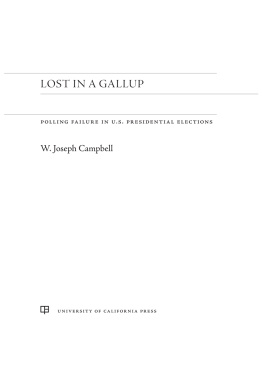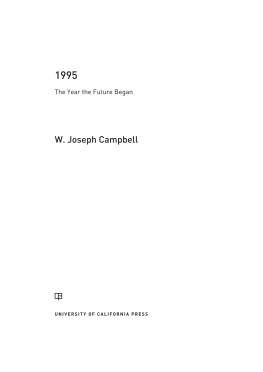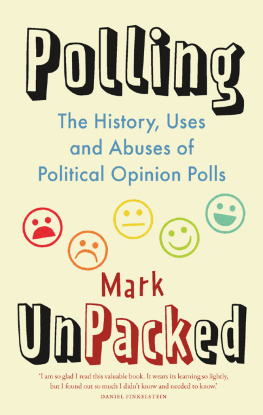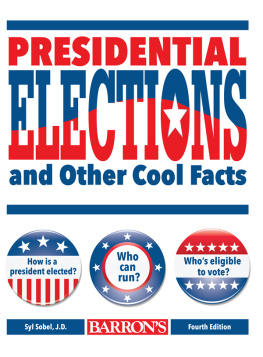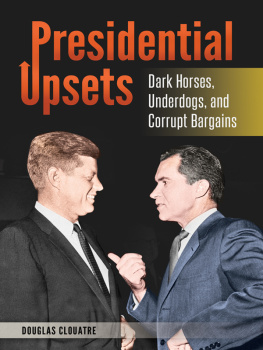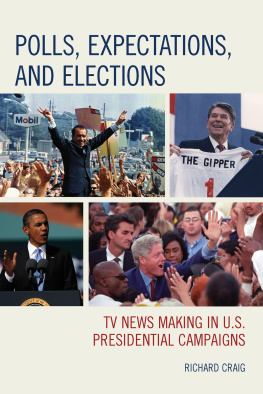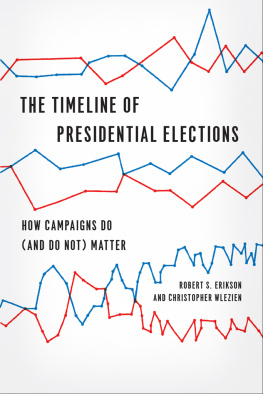ACKNOWLEDGMENTS
Researching this book took me to archival collections in quite a few places and brought me in touch with many generous people. Notable among them was the staff at the Thomas J. Dodd Research Center at the University of Connecticut at Storrs, home to important collections of papers of the pollsters Archibald M. Crossley, Warren J. Mitofsky, and Elmo Roper. I am grateful for the courtesy and assistance of personnel there, including Nicholas Hurley, Matthew Slowik, and Trisha Sundman, and the university archivist, Betty Pittman.
My research into polls, pollsters, and journalists took me to presidential libraries as well. Paul Sparrow, Virginia Lewick, and their colleagues at the Franklin D. Roosevelt library were welcoming and most helpful. So, too, were Randy Sowell and his colleagues at the Harry S. Truman library, and Kevin Bailey at the Dwight D. Eisenhower library.
The Library of Congress in Washington, DC, is an exceptional research institution and on this and other book projects I benefited from the insights, expertise, and courtesy of Georgia M. Higley, Arlene Balkansky, Jeff Flannery, and their colleagues. Rick Mastroianni of the now-closed Newseum in Washington was welcoming and generous with his time in early phases of my research. Matthew Turi of the special collections staff at the University of North Carolina at Chapel Hill was helpful as I worked through the Louis Harris papers. Lin Fredericksen and her colleagues were accommodating during my review of the Alf Landon papers at the Kansas Historical Society in Topeka.
My research trips were supported by the generosity of the Association for Education in Journalism and Mass Communication (which also considers polling issues from time to time at its annual conferences) and my academic home, the School of Communication at American University. I am most grateful to Jennifer McGill, the executive director of AEJMC, and to her gracious colleague, Lillian Coleman, for the research grant that helped enable my travels. Jeff Rutenbeck, the former dean of the universitys School of Communication, was unstinting in supporting my research, for which I am deeply grateful. My colleagues at American, including Laura DeNardis and Amy Eisman, were also very supportive, and I enjoyed and benefited from conversations with them.
Graduate assistants made important contributions to the research. Special thanks goes to Kip Dooley for his diligence, suggestions, and the hours he spent at the Library of Congress. Kurt Wirth, another graduate assistant, was quite helpful in latter stages of the project. Ruxandra Giura, a talented data journalist, made important contributionsas she has on several of my book projects. Her willingness to field my inquiries patiently and with courtesy was much appreciated.
Shane Hickey of American Universitys interlibrary loan staff did outstanding work in locating obscure and elusive material important to this project. Chris Lewis at the universitys Bender Library provided important guidance in my tracking down decades-old audio files of programs such as those of George Gallups appearance on Meet the Press. Gallups papers are housed at the University of Iowas special collections, where I spent a number of productive days.
The support and suggestions of Reed Malcolm, a senior editor at University of California Press, were vital to this books coming together. It was a pleasure to collaborate with Reed on this, my fourth book project with the press. His colleagues Dore Brown, Peter Perez, and Archna Patel were wonderful to work with.
The press arranged for Madeleine Adams to copyedit the book and her efforts were outstanding. I am grateful for her scrutiny, patience, talents, and good cheer.
Dominic Lusinchi, who has done outstanding work on the sociology and history of election polling, offered valuable observations on early versions of the manuscript. Joel Best read the near-final manuscript closely and provided important suggestions.
I enjoyed my talks with pollsters and polling experts, especially those conversations with Charles Franklin, director of the Marquette University Law School poll; Spencer Kimball, director of the Emerson College poll; Samuel Wang of the Princeton Election Consortium; and Tim Johnson, a past president of the American Association for Public Opinion Research, or AAPOR. Survey research is a notably innovative field that also is wrestling with profound challenges, including the steep decline in participation by would-be poll respondents. AAPOR conferences offered important insights into the state of contemporary opinion polling and, to be sure, into the performance of polls in the 2016 presidential election.
My wife, Ann-Marie Regan, was patient and supportive as I researched and wrote this book. She is a Connecticut native and especially enjoyed joining me on research trips to Storrs. It is to Ann-Marie this book is dedicated.
Introduction
Of Pollsters, Journalists, and Presidential Elections
It was the eve of the 2016 presidential election, and Natalie Jackson, senior polling editor for the Huffington Post, seemed supremely confident. She pegged Hillary Clinton as the near-certain winner. So did many pollsters, analysts, pundits, and journalists. But Jackson had ample data to support her confidence. Or so she thought.
Jackson coordinated the Huffington Post s polls-based statistical model that was designed to forecast the elections outcome. She did not equivocate in her final analysis. The HuffPost presidential forecast model, she wrote, gives Democrat Hillary Clinton a 98.2 percent chance of winning the presidency. Republican Donald Trump has essentially no path to an Electoral College victory. Clintons win will be substantial, but not overwhelming. The model projects that shell garner 323 electoral votes to Trumps 215. Clinton, she added, should fairly easily hold onto Michigan, Wisconsin and Pennsylvania and stood better than an 80 percent chance of carrying Florida and North Carolina.

